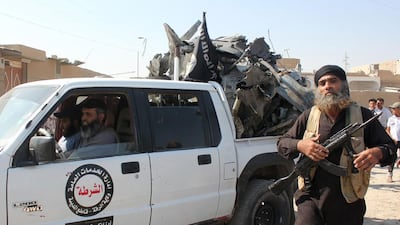BEIRUT // The militant group ISIL has gone underground in its Syrian stronghold since US president Barack Obama authorised air strikes on the group in Syria, disappearing from the streets, redeploying weapons and fighters, and cutting down its media exposure.
In the city of Raqqa, 450 kilometres north-east of Damascus, residents say ISIL has been moving equipment every day since Mr Obama signalled on September 11 that air attacks on its forces could be expanded from Iraq to Syria.
ISIL activists who typically answer questions on the internet have been offline since then. Its leaders have not given a direct response to Mr Obama: his speech last week was not mentioned in a video released on Saturday showing the beheading of British hostage David Haines by an ISIL militant.
As the United States tries to assemble a coalition to fight ISIL, the militant group appears to be trying to leave as much uncertainty as possible about its strategy.
Facing US airstrikes in Iraq, ISIL fighters abandoned heavy weaponry that made them easy targets and tried to blend into civilian areas. In anticipation of similar raids in Syria, the group may already be doing the same.
In Raqqa, the group has evacuated buildings it was using as offices, redeployed its heavy weaponry, and moved fighters’ families out of the city.
“They are trying to keep on the move,” said one Raqqa resident, communicating via the internet and speaking on condition of anonymity because of safety fears. “They have sleeper cells everywhere,” he added.
“They only meet in very limited gatherings.”
The top US general promised on Tuesday “a persistent and sustainable campaign” against ISIL in Syria, and Washington is probably already watching its positions in Raqqa. Mr Obama approved surveillance flights over Syria last month, and footage taken by activists earlier this month appeared to show an American-made drone over the city.
The militants are not dormant; the Syrian Observatory for Human Rights, which tracks violence in the country’s civil war, said they had shot down a Damascus government warplane near Raqqa using anti-aircraft guns.
However, another resident said: “Islamic State is now carrying out tactical defensive moves by relocating their assets to different places so that their heavy weaponry is not all concentrated in one place.”
Raqqa and the surrounding province is ISIL’s main base in Syria. Last month, its fighters drove the final government forces from the area when it seized an air base.
Since seizing the Iraqi city of Mosul in June, the group has also extended its control over neighbouring Deir Al Zor province, which borders Iraq. Making good on its promise to redraw the Middle East, ISIL has declared a new province including territory on both sides of the frontier.
In Raqqa, ISIL had taken charge of many aspects of civilian life, managing everything from traffic to bakeries in an effort to establish a state run according to its own, radical interpretation of Islam.
ISIL has been trying to give a sense of business as normal even as it reduced its presence in the streets, said another resident of the city whose population numbered about 200,000 before the civil war. “They are giving the impression they don’t care,” the resident said.
“These days the fighters are not deployed heavily on the streets. Only those who have to are appearing. The streets are empty and the people are worried and scared.”
Some activists did appear on the outskirts of Raqqa on Tuesday. They were pictured collecting wreckage of the downed Syrian war plane and loading it into the back of a truck flying the group’s black flag.
Since Obama’s speech, shops in Raqqa have been closing early and the value of the US dollar has jumped in the local hard currency market, residents said. Dozens of people have left the city, though there has been no sign of mass migration.
While preparing for an attack, ISIL has also been trying to promote its cause among residents. Some already express support for the group whose rule has brought a modicum of stability, albeit in a hardline form.
A 14-point statement distributed in recent days reminded residents of ISIL rules such as its ban on smoking and drinking, and requirement for women to cover up and stay at home. It also warned that anyone who dealt with president Bashar Al Assad’s government would face death.
But the statement also tried to promote the group, telling residents they would see “the great difference” between Islamic State rule and that of the “oppressive secular government” – a reference to Mr Al Assad. “Live joyfully and in plenty in an Islamic government,” declared the statement, which was obtained by the Syrian Observatory for Human Rights.
* Reuters

